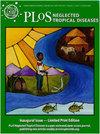公众对登革热的认识、信念和预防措施:孟加拉国农村社区调查的结果
IF 3.4
2区 医学
Q1 Medicine
引用次数: 0
摘要
登革热是最普遍的蚊媒病毒感染,是孟加拉国反复出现的公共卫生威胁。尽管政府作出了努力,但登革热疫情仍呈上升趋势,而在农村社区一级,人们对该疾病的了解和预防措施尚不清楚。本研究的目的是评估孟加拉国农村社区居民对登革热及其相关因素的知识、信念和预防措施的水平。在2021年8月至9月期间,采用方便的抽样技术对萨瓦尔三个工会的401人进行了横断面调查。参与者的回答是通过面对面访谈收集的,使用预先测试的结构化问卷,其中包括与社会人口统计学、登革热相关知识、预防措施以及健康信念模型(HBM)结构相关的信息。采用多元线性回归分析确定与登革热知识和预防措施相关的因素。总体而言,参与者(平均年龄= 33.47±12.96岁;年龄范围18-75岁)正确回答了66.15%的登革热知识问题。高等教育、前往登革热危险地区旅行和HBM结构下的自我效能感均显示与登革热知识密切相关。关于HBM结构,大约80%的参与者认为登革热是危险的,但不到一半(41.4%)的人认为自己易患登革热。考虑到感知障碍,73.07%的被调查者认为居住地不适合伊蚊孳生。几乎所有(93.52%)的人认为他们经常保持周围环境清洁是自我效能感的一部分。此外,参与者平均参与了所有登革热预防措施的53.69%。年龄、女性、高学历、服务人员、房屋结构质量好、感知易感性和HBM结构下的自我效能感都是影响参与者登革热预防活动的因素。研究表明,参与者的登革热预防措施受到其知识的显著影响。这项研究的结果发现,社区居民对登革热的了解程度中等。尽管参与者在预防登革热的几个方面有良好的做法,但总体得分不够。这表明,迫切需要扩大教育宣传,以提高公众对登革热的认识,并鼓励孟加拉国农村社区采取预防措施。本文章由计算机程序翻译,如有差异,请以英文原文为准。
Public knowledge, belief, and preventive practices regarding dengue: Findings from a community-based survey in rural Bangladesh
Dengue fever, the most prevalent mosquito-borne viral infection, is a recurrent public health threat in Bangladesh. Despite the government’s efforts, dengue fever outbreaks are on the upswing, and people’s knowledge and preventive practices regarding the disease at the rural community level are unclear.
The objective of this study was to assess the level of knowledge, belief and preventive practices regarding dengue and associated factors among community people from rural Bangladesh.
A cross-sectional survey was conducted involving 401 people using a convenient sampling technique from three unions of Savar from August to September 2021. Participants’ responses were collected through face-to-face interviews using a pre-tested structured questionnaire that included information related to socio-demographics, dengue-related knowledge, preventive practices, as well as the health belief model (HBM) constructs. Multiple linear regression analysis was performed to determine the factors associated with the knowledge and preventive practices of dengue.
Overall, participants (mean age = 33.47 ± 12.96 years; age range = 18–75 years) correctly answered 66.15% of the knowledge questions regarding dengue. Higher education, travel to dengue-risk regions, and self-efficacy under the HBM construct were all shown to be strongly associated with dengue knowledge. Regarding HBM constructs, about 80% of the participants perceived dengue as dangerous, but less than half (41.4%) believed themselves susceptible to dengue. Considering perceived barriers, 73.07% of the participants believed their residential area was not suitable for Aedes mosquito breeding. Nearly all (93.52%) believed they always kept their surrounding area clean as part of self-efficacy. Moreover, on average participants engaged in 53.69% of all dengue preventive practices. Being older, female, having a higher education, being a service holder, having a good quality of house structure, and perceived susceptibility as well as self-efficacy under the HBM construct were all factors in participants’ dengue prevention activities. Participants’ dengue preventative practices were shown to be significantly influenced by their knowledge.
The findings of this study found a moderate level of knowledge regarding dengue among the community people. Despite having good practices in several aspects of dengue prevention among the participants, the overall score was not sufficient. This suggests that there is a pressing need for expanded education outreach aimed at increasing public awareness of dengue and encourage preventive practices within rural communities in Bangladesh.
求助全文
通过发布文献求助,成功后即可免费获取论文全文。
去求助
来源期刊

PLoS Neglected Tropical Diseases
Medicine-Infectious Diseases
CiteScore
7.40
自引率
10.50%
发文量
723
审稿时长
2-3 weeks
期刊介绍:
PLOS Neglected Tropical Diseases publishes research devoted to the pathology, epidemiology, prevention, treatment and control of the neglected tropical diseases (NTDs), as well as relevant public policy.
The NTDs are defined as a group of poverty-promoting chronic infectious diseases, which primarily occur in rural areas and poor urban areas of low-income and middle-income countries. Their impact on child health and development, pregnancy, and worker productivity, as well as their stigmatizing features limit economic stability.
All aspects of these diseases are considered, including:
Pathogenesis
Clinical features
Pharmacology and treatment
Diagnosis
Epidemiology
Vector biology
Vaccinology and prevention
Demographic, ecological and social determinants
Public health and policy aspects (including cost-effectiveness analyses).
 求助内容:
求助内容: 应助结果提醒方式:
应助结果提醒方式:


